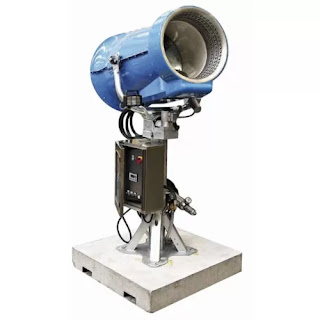The Importance of Dust Control Solutions in Workplace Safety
Dust control solutions play a crucial role in ensuring workplace safety across various industries. Here's why they are important:
Health Risks Mitigation: Dust particles generated from various industrial processes can pose serious health risks to workers. Inhalation of dust containing harmful substances such as silica, asbestos, heavy metals, or organic compounds can lead to respiratory problems, lung diseases (like silicosis or asbestosis), allergies, and even cancer. Effective dust control measures help mitigate these health risks by reducing workers' exposure to hazardous dust particles.
Fire and Explosion Prevention: Certain types of dust, such as combustible dust (e.g., wood, metal, or chemical dust), can create explosive atmospheres when suspended in the air at high concentrations. Without proper dust control measures, the accumulation of combustible dust in work areas can lead to catastrophic explosions and fires. Dust control solutions help prevent these incidents by minimizing dust accumulation and dispersal, reducing the risk of ignition sources coming into contact with combustible dust clouds.
Equipment Maintenance and Efficiency: Dust accumulation on machinery and equipment can impair their performance, leading to increased downtime, maintenance costs, and decreased operational efficiency. Dust control measures, such as regular cleaning, ventilation, and the use of dust suppression systems, help maintain equipment in optimal condition, prolong their lifespan, and ensure smooth operation.
Environmental Protection: Dust emissions from industrial activities can not only affect workers' health but also contribute to environmental pollution. Dust particles can settle on surrounding land, water bodies, and vegetation, leading to soil erosion, water contamination, and ecosystem damage. Implementing effective dust control solutions helps minimize environmental impact by containing dust emissions within the workplace and preventing them from dispersing into the surrounding environment.
Regulatory Compliance: Many regulatory agencies impose strict guidelines and standards regarding workplace dust exposure limits and control measures to protect workers' health and safety. Failure to comply with these regulations can result in fines, legal liabilities, and reputational damage for businesses. Employing proper dust control solutions ensures compliance with regulatory requirements and demonstrates a commitment to maintaining a safe work environment.
Worker Productivity and Morale: A clean and safe work environment fosters higher levels of worker productivity, morale, and satisfaction. Implementing dust control measures not only protects workers' health but also creates a more comfortable and conducive workplace, leading to increased employee satisfaction, retention, and overall productivity.
In summary, dust control solutions are essential for safeguarding workers' health and safety, preventing workplace accidents and illnesses, maintaining regulatory compliance, protecting the environment, and promoting overall productivity and well-being in the workplace.
Health Risks Mitigation: Dust particles generated from various industrial processes can pose serious health risks to workers. Inhalation of dust containing harmful substances such as silica, asbestos, heavy metals, or organic compounds can lead to respiratory problems, lung diseases (like silicosis or asbestosis), allergies, and even cancer. Effective dust control measures help mitigate these health risks by reducing workers' exposure to hazardous dust particles.
Fire and Explosion Prevention: Certain types of dust, such as combustible dust (e.g., wood, metal, or chemical dust), can create explosive atmospheres when suspended in the air at high concentrations. Without proper dust control measures, the accumulation of combustible dust in work areas can lead to catastrophic explosions and fires. Dust control solutions help prevent these incidents by minimizing dust accumulation and dispersal, reducing the risk of ignition sources coming into contact with combustible dust clouds.
Equipment Maintenance and Efficiency: Dust accumulation on machinery and equipment can impair their performance, leading to increased downtime, maintenance costs, and decreased operational efficiency. Dust control measures, such as regular cleaning, ventilation, and the use of dust suppression systems, help maintain equipment in optimal condition, prolong their lifespan, and ensure smooth operation.
Environmental Protection: Dust emissions from industrial activities can not only affect workers' health but also contribute to environmental pollution. Dust particles can settle on surrounding land, water bodies, and vegetation, leading to soil erosion, water contamination, and ecosystem damage. Implementing effective dust control solutions helps minimize environmental impact by containing dust emissions within the workplace and preventing them from dispersing into the surrounding environment.
Regulatory Compliance: Many regulatory agencies impose strict guidelines and standards regarding workplace dust exposure limits and control measures to protect workers' health and safety. Failure to comply with these regulations can result in fines, legal liabilities, and reputational damage for businesses. Employing proper dust control solutions ensures compliance with regulatory requirements and demonstrates a commitment to maintaining a safe work environment.
Worker Productivity and Morale: A clean and safe work environment fosters higher levels of worker productivity, morale, and satisfaction. Implementing dust control measures not only protects workers' health but also creates a more comfortable and conducive workplace, leading to increased employee satisfaction, retention, and overall productivity.
In summary, dust control solutions are essential for safeguarding workers' health and safety, preventing workplace accidents and illnesses, maintaining regulatory compliance, protecting the environment, and promoting overall productivity and well-being in the workplace.



Comments
Post a Comment